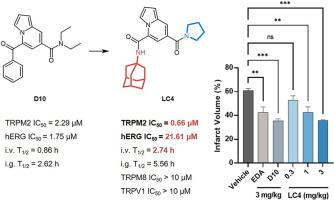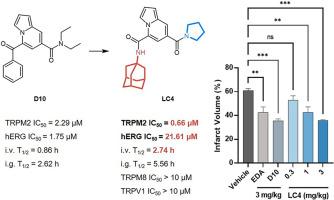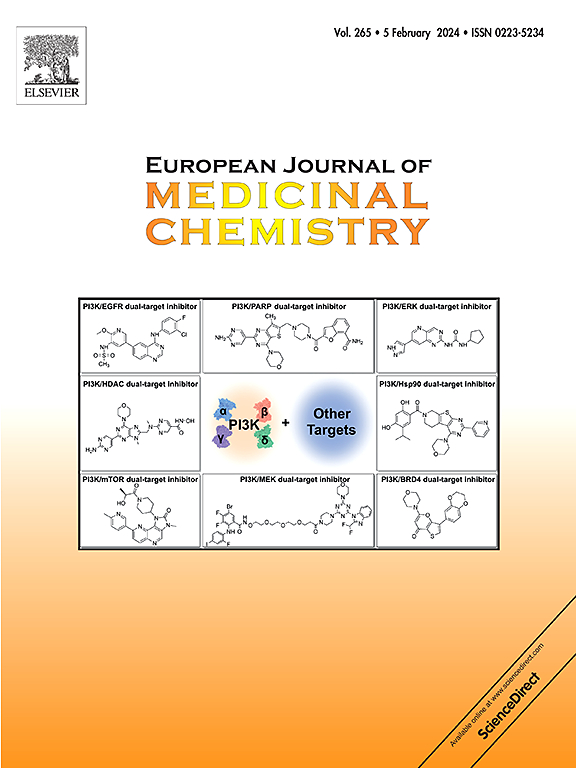金刚烷基衍生物作为有效和选择性TRPM2抑制剂的发现,显著降低了hERG的责任
IF 5.9
2区 医学
Q1 CHEMISTRY, MEDICINAL
引用次数: 0
摘要
缺血性中风仍然是世界范围内死亡的主要原因。瞬时受体电位美拉他汀2 (TRPM2)是一种参与缺血-再灌注损伤的钙渗透通道,已成为一个有希望的靶点。我们之前报道了一种有效的TRPM2抑制剂D10,但随后的人醚-à-go-go-related基因(hERG)抑制实验显示,对这两个通道的微摩尔活性相当,表明安全窗口很窄。hERG安全性的进一步战略优化导致了LC4的开发,其特点是新安装了adamantyl基团。综合表征,包括钙成像、电生理和药代动力学研究,表明LC4表现出增强的TRPM2抑制作用,降低hERG负性,保留选择性,改善代谢稳定性。在短暂性大脑中动脉闭塞(tMCAO)模型中,LC4显著降低梗死面积和氧化应激水平。这些结果表明LC4可能是治疗缺血性卒中的有希望的临床前候选药物。本文章由计算机程序翻译,如有差异,请以英文原文为准。


Discovery of adamantyl derivatives as potent and selective TRPM2 inhibitors with significantly reduced hERG liability
Ischemic stroke remains a leading cause of mortality worldwide. Transient receptor potential melastatin 2 (TRPM2), a calcium-permeable channel involved in ischemia–reperfusion injury, has emerged as a promising target. We previously reported an effective TRPM2 inhibitor D10, but subsequent human ether-à-go-go-related gene (hERG) inhibition assays revealed comparable micromolar activity against both channels, indicating a narrow safety window. Further strategic optimization of the hERG safety profile led to the development of LC4, featuring a newly installed adamantyl group. Comprehensive characterization, including calcium imaging, electrophysiological, and pharmacokinetic studies, demonstrated that LC4 exhibited enhanced TRPM2 inhibition, reduced hERG liability, retained selectivity, and improved metabolic stability. In a transient middle cerebral artery occlusion (tMCAO) model, LC4 reduced the infarct volume and oxidative-stress level significantly. These results suggest that LC4 could be a promising preclinical candidate for treatment of ischemic stroke.
求助全文
通过发布文献求助,成功后即可免费获取论文全文。
去求助
来源期刊
CiteScore
11.70
自引率
9.00%
发文量
863
审稿时长
29 days
期刊介绍:
The European Journal of Medicinal Chemistry is a global journal that publishes studies on all aspects of medicinal chemistry. It provides a medium for publication of original papers and also welcomes critical review papers.
A typical paper would report on the organic synthesis, characterization and pharmacological evaluation of compounds. Other topics of interest are drug design, QSAR, molecular modeling, drug-receptor interactions, molecular aspects of drug metabolism, prodrug synthesis and drug targeting. The journal expects manuscripts to present the rational for a study, provide insight into the design of compounds or understanding of mechanism, or clarify the targets.

 求助内容:
求助内容: 应助结果提醒方式:
应助结果提醒方式:


